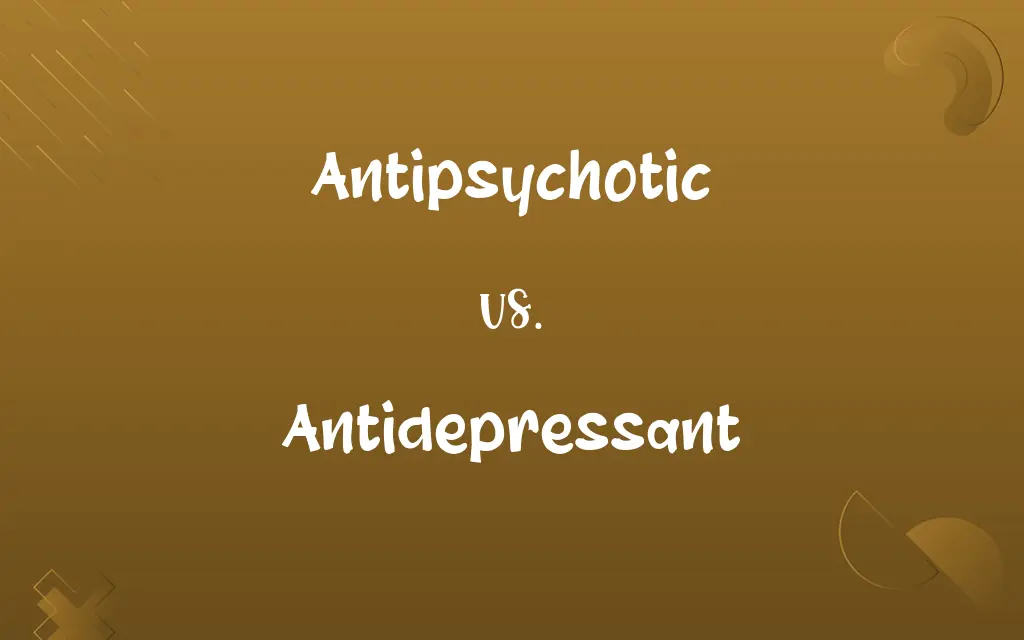Antipsychotic vs. Antidepressant: Know the Difference

By Shumaila Saeed || Published on January 14, 2024
Antipsychotics are medications used to treat psychosis, including conditions like schizophrenia. Antidepressants are drugs prescribed to alleviate symptoms of depression and anxiety disorders.

Key Differences
Antipsychotics are primarily used to manage psychosis, including hallucinations and delusions, often seen in schizophrenia and bipolar disorder. Antidepressants, in contrast, are designed to alleviate symptoms of depression, including persistent sadness and lack of interest in activities.
Shumaila Saeed
Jan 14, 2024
The mechanism of action for antipsychotics typically involves dopamine receptor antagonism, which helps in reducing psychotic symptoms. Antidepressants, however, often work by altering the levels of neurotransmitters like serotonin and norepinephrine in the brain to improve mood and emotional state.
Shumaila Saeed
Jan 14, 2024
Antipsychotic medications can also be used in the management of severe mood disorders and aggression. Antidepressants, besides treating depression, are also effective in treating a range of anxiety disorders, obsessive-compulsive disorder, and certain chronic pain conditions.
Shumaila Saeed
Jan 14, 2024
Side effects of antipsychotics can include weight gain, drowsiness, and sometimes movement disorders. In contrast, antidepressants can cause side effects like sexual dysfunction, weight changes, and insomnia or drowsiness.
Shumaila Saeed
Jan 14, 2024
Antipsychotics can be divided into two categories: typical and atypical, with the latter having fewer side effects. Antidepressants are categorized into several classes, including SSRIs, SNRIs, and tricyclics, each with different mechanisms and side effect profiles.
Shumaila Saeed
Jan 14, 2024
ADVERTISEMENT
Comparison Chart
Primary Use
Treating psychosis (e.g., schizophrenia, bipolar)
Treating depression and anxiety disorders
Shumaila Saeed
Jan 14, 2024
Mechanism of Action
Dopamine receptor antagonism
Altering neurotransmitter levels (serotonin, etc.)
Shumaila Saeed
Jan 14, 2024
Additional Uses
Managing severe mood disorders, aggression
Treating OCD, certain chronic pains
Shumaila Saeed
Jan 14, 2024
Common Side Effects
Weight gain, drowsiness, movement disorders
Sexual dysfunction, weight changes, sleep issues
Shumaila Saeed
Jan 14, 2024
ADVERTISEMENT
Antipsychotic and Antidepressant Definitions
Antipsychotic
Medication used in the treatment of schizophrenia.
The patient's schizophrenia was managed effectively with an antipsychotic.
Shumaila Saeed
Dec 16, 2023
Antidepressant
Medication primarily used to treat major depressive disorder.
He started feeling better after taking an antidepressant for a few weeks.
Shumaila Saeed
Dec 16, 2023
Antipsychotic
Medicines that can reduce aggression in certain mental health conditions.
An antipsychotic was used to calm the patient's aggressive outbursts.
Shumaila Saeed
Dec 16, 2023
Antidepressant
Drugs that can increase serotonin levels in the brain.
Her doctor prescribed an antidepressant to balance her serotonin levels.
Shumaila Saeed
Dec 16, 2023
Antipsychotic
A class of drugs for managing severe bipolar disorder.
Her bipolar episodes were better controlled when she was prescribed an antipsychotic.
Shumaila Saeed
Dec 16, 2023
ADVERTISEMENT
Antidepressant
Medications that can be used for chronic pain management.
The doctor suggested an antidepressant for his chronic neuropathic pain.
Shumaila Saeed
Dec 16, 2023
Antipsychotic
A drug that mitigates psychotic symptoms like delusions.
After starting the antipsychotic, his hallucinations significantly decreased.
Shumaila Saeed
Dec 16, 2023
Antidepressant
Medicines often used for anxiety and panic disorders.
An antidepressant was effective in managing her panic attacks.
Shumaila Saeed
Dec 16, 2023
Antipsychotic
Drugs that antagonize dopamine receptors in the brain.
The doctor explained that the antipsychotic works by blocking certain brain receptors.
Shumaila Saeed
Dec 16, 2023
Antidepressant
A class of drugs that can improve mood and emotional well-being.
She felt her mood improve after the antidepressant regimen was initiated.
Shumaila Saeed
Dec 16, 2023
Antipsychotic
Counteracting or diminishing the symptoms of psychotic disorders, such as schizophrenia.
Shumaila Saeed
Dec 13, 2023
Antidepressant
(pharmaceutical drug) An agent that prevents or counteracts depression.
Shumaila Saeed
Dec 13, 2023
Antipsychotic
(pharmaceutical effect) Preventing or counteracting psychosis.
Shumaila Saeed
Dec 13, 2023
Antidepressant
(pharmaceutical effect) Preventing or counteracting depression.
Shumaila Saeed
Dec 13, 2023
Antipsychotic
(pharmaceutical drug) Any of a group of drugs used to treat psychosis.
Shumaila Saeed
Dec 13, 2023
Antidepressant
Any of a class of drugs used to treat depression; often have undesirable side effects
Shumaila Saeed
Dec 13, 2023
Antipsychotic
Tranquilizer used to treat psychotic conditions when a calming effect is desired
Shumaila Saeed
Dec 13, 2023
Repeatedly Asked Queries
What are antipsychotics used for?
They are used to treat conditions like schizophrenia and bipolar disorder.
Shumaila Saeed
Jan 14, 2024
What are the common side effects of antidepressants?
Common side effects may include nausea, insomnia, and sexual dysfunction.
Shumaila Saeed
Jan 14, 2024
Are antidepressants safe during pregnancy?
The safety of antidepressants during pregnancy varies, and it's essential to discuss the risks and benefits with a healthcare provider if pregnant or planning to become pregnant.
Shumaila Saeed
Jan 14, 2024
Can antidepressants be used for conditions other than depression and anxiety?
Sometimes, antidepressants are prescribed for other conditions like chronic pain, migraine, and certain eating disorders.
Shumaila Saeed
Jan 14, 2024
Can antidepressants help with anxiety?
Yes, they are often prescribed for various anxiety disorders.
Shumaila Saeed
Jan 14, 2024
Do antipsychotics have side effects?
Yes, they can cause weight gain, drowsiness, and sometimes movement disorders.
Shumaila Saeed
Jan 14, 2024
Are antipsychotics only used for schizophrenia?
No, antipsychotics can also be prescribed for other conditions like bipolar disorder, schizoaffective disorder, and severe agitation.
Shumaila Saeed
Jan 14, 2024
How long does it take for antidepressants to start working?
It can take several weeks for the full therapeutic effect of antidepressants to be felt, although some improvement may occur earlier.
Shumaila Saeed
Jan 14, 2024
Are there different types of antidepressant medications?
Yes, there are several classes of antidepressants, including SSRIs, SNRIs, tricyclic antidepressants, and atypical antidepressants.
Shumaila Saeed
Jan 14, 2024
Are there different types of antipsychotic medications?
Yes, antipsychotics are categorized into typical (first-generation) and atypical (second-generation) drugs, each with its own set of properties.
Shumaila Saeed
Jan 14, 2024
Can you stop taking antidepressants suddenly?
It is generally not recommended to stop taking antidepressants abruptly, as it can lead to withdrawal symptoms. Tapering off under medical supervision is advised.
Shumaila Saeed
Jan 14, 2024
How long does it take for antipsychotic medications to start working?
The onset of action can vary, but some improvement in symptoms may be seen within days to weeks, while the full effect may take several weeks to months.
Shumaila Saeed
Jan 14, 2024
Are antidepressants effective for everyone with depression?
Antidepressant effectiveness can vary from person to person, and not all individuals with depression will respond equally to these medications. Different types may be tried if one is not effective.
Shumaila Saeed
Jan 14, 2024
Can antipsychotics be used to treat anxiety or depression?
Occasionally, antipsychotics may be prescribed alongside other medications to help manage severe anxiety or depression, but they are not typically first-line treatments for these conditions.
Shumaila Saeed
Jan 14, 2024
What is tardive dyskinesia, a side effect associated with some antipsychotics?
Tardive dyskinesia is a movement disorder characterized by involuntary, repetitive movements of the face and body, which can develop after long-term use of certain antipsychotic drugs.
Shumaila Saeed
Jan 14, 2024
Is a prescription required for antipsychotic medication?
Yes, antipsychotic medications are prescription drugs and should be taken under medical supervision.
Shumaila Saeed
Jan 14, 2024
Are antipsychotic medications addictive?
No, antipsychotics are not considered addictive.
Shumaila Saeed
Jan 14, 2024
Share this page
Link for your blog / website
HTML
Link to share via messenger
About Author
Written by
Shumaila SaeedShumaila Saeed, an expert content creator with 6 years of experience, specializes in distilling complex topics into easily digestible comparisons, shining a light on the nuances that both inform and educate readers with clarity and accuracy.









































































